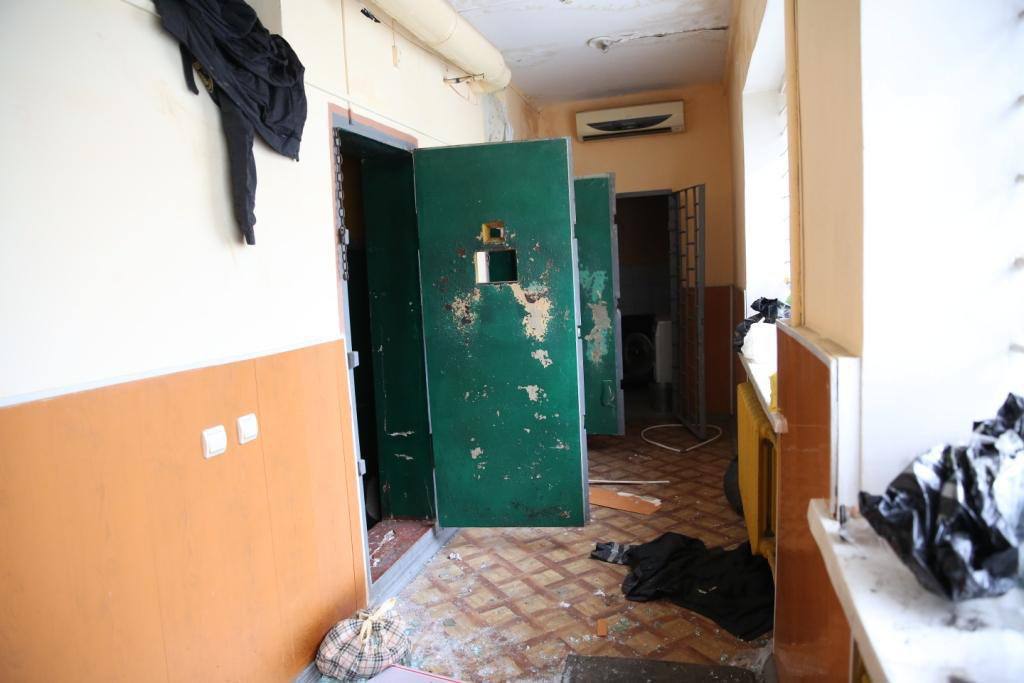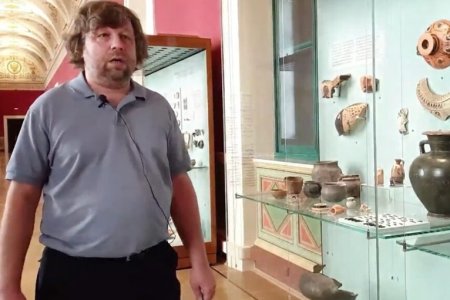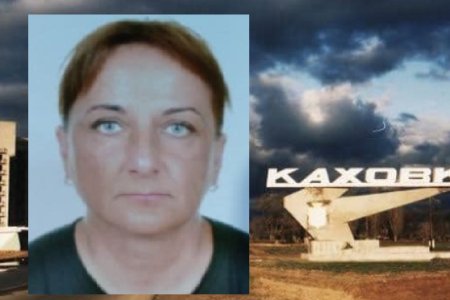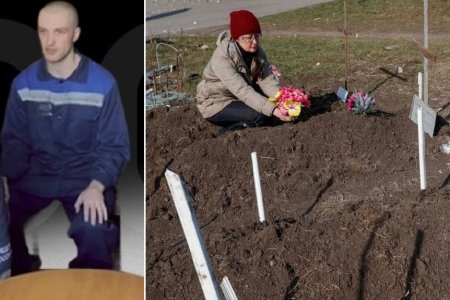
…Now, a resident of Balakliya, Oleksii works in a special rescue unit of the State Emergency Service. And he also volunteers: he carries equipment and spare parts for our guys to the hottest areas of the front — Pokrovsk, Kupiansk, and he has been to Sudzha. He also volunteered during the occupation, helping people put out fires. That is, until people in masks came to get him.
— Before the occupation, I was working in the fire and forest protection agency, — the man recalls. — When the Russians came to live in our forest farm, they took away all the forestry equipment. And I decided to steal my work car. It was a new “Kamaz”. So I stole this car from under their noses and drove it to the Balakliya State Emergency Service unit. And on May 13, an armored personnel carrier drove up to my house. 10-11 people, in masks, with shields… That’s how they took my brother and me! I don’t know what they have been told. They put bags over our heads and took us to the district police station. But first, they drove around the city so that we would get confused, so that we wouldn’t know where they were taking us, because we were locals.
375 milliliters of water per day

In Balakliya, the Russians set up two torture chambers — in the local printing house and in the administrative building of the police department. After the de-occupation in September 2022, the head of the Kharkiv region police investigation department, Serhii Bolvinov, spoke about the latter place of illegal detention of civilians: “During an inspection of the building, we discovered wires leading to hidden video cameras in the rooms where hostages were held. People, including women, slept on the floor, and during interrogations they were tortured with electric shocks.”
Oleksii was thrown into the first cell, while his brother was thrown into the third. Oleksii recalls that up to eight men were kept in a room designed for two people. Among them were both residents of Balakliya and those from other settlements in the region. Here, Oleksii spent 41 days in the stuffiness and darkness: there was no window in the cell — only a so-called “feeder” in the door, through which plates of food were served.
— Sometimes they would feed us, sometimes they would forget… Or they would give leftovers from the military. It was apparent it was slop. I lost eight to ten kilograms during my captivity… It was very hot, and for eight of us, we were given two one-and-a-half-liter bottles of water a day. There was no ventilation in the cell, and the humidity was high; as a result, water ran down the walls, and the plaster from the ceiling constantly fell off in pieces. When it was getting tough, we would lie down on the floor. It was a little easier to breathe that way.
He tied his broken fingers around a tile fragment
The Russians accused Oleksii and his brother of being civilian spotters. The man suspects that he was denounced by one of the locals. Oleksii’s pro-Ukrainian position was well-known to many, but he was certain that the “snitch” was one of his former friends, who knew a great deal about him. During the search, the occupiers knew precisely how many rifles he had (he was a skilled hunter), where to look, and what to look for.
— They took my phone, money, two cars, — Oleksii recounts. — They took everything I had. They just robbed me. My wife said that they came back two or three more times to search the premises. I don’t know what else they were looking for. During the interrogations, they threatened to do something to my brother, but they threatened my wife and mother the most. They said, “We’ll come and deal with them.”
However, it is difficult to classify their methods as interrogations. Each time, it was brutally cruel torture.
— They always found something to beat me for. They wanted to break me. They say, “Will you walk around the city with the Russian flag?” I answer: “Of course not!” So they beat me… During the second “interrogation”, three of them beat me with rubber batons. They even broke one baton on me. They beat my muscles and joints so that afterwards it was complicated to move. And they beat me on the head, in every place possible. They used electricity. They had a bunch of tasers. “Well, try it, which one is better — this one or that one?” And so they tortured me to see which hits harder.
During such “interrogations,” Oleksii had eight fingers broken, his skull fractured. The torturers did not provide medical care to prisoners.
— I once worked as an ambulance driver with an excellent paramedic and doctor. They taught me a lot. It was thanks to them that I saved my fingers. There was a tile in the cell, so I broke it into pieces, tore my T-shirt, and tied my fingers together with a fragment of the tile. There was a displacement, so one finger grew crookedly. However, the others healed more or less evenly.
One of the “interrogations” ended with a traumatic brain injury for Oleksii. The half-alive man was simply thrown out of the torture chamber.
— They thought I was going to die. They threw me out of the district police station onto the street. As I remember now, it was raining… They said, “If you survive, come back tomorrow!” And my brother was still in captivity at that time. I somehow got home and only washed off the blood, and the next day I returned to them myself. My relatives were persuading me to escape somewhere at night, I am a local and know all the ways… But if I had not returned, they would have killed my brother. How can I live with this then? I returned to the torture chamber, and my brother was immediately released. And I stayed for another 30 days…
Mock execution
The executioners repeatedly threatened Oleksii with death, shot above his head, near his ear, under his feet… When they realized that they would not get any information from the Ukrainian, they decided to scare him even more.
— They took me to some pit. There were two murdered people in the pit. I don’t remember the one at the bottom, but on top was a man in blue jeans who was shot. They put me on my knees. They say: “You have a choice: either you tell us everything, or you go to them!” I hear the bolt being pulled behind me. I think: well, that’s it… Then they fired above my ear. They lifted me. They ran their hand down my pants. “No,” they say. “He didn’t wet himself.” They threw me into a car and took me to the torture chamber again.
The second time they took him to be shot was in June. After another “interrogation,” they put a bag over his head, threw him into a car, and took him to a forest.
— I think it wasn’t a real big forest, but some plantation in the middle of a field, because the pine trees were very twisted, pine grows so poorly on black soil, it needs sand, — Oleksii thinks. — The hole was dug, but this time it was empty. “Now we’ll finish you!” They started shooting, near the ear, near the head. And then they threw me in the car and took me back to Balakliya. In the car, they started asking me about weapons. They asked: “Do you have a carbine?” I said, “You took everything.” And they said, “We didn’t find it. Where did you hide it?” I explained, and they said, “Well, if you find the carbine now, we’ll let you go.” As if everything depended only on this hunting carbine… They brought me home, and I gave them that carbine. It was still disassembled and non-working. It was no longer possible to shoot from it. And they left me at home. After that, I remained in the occupation, although I could have left at any time, because I knew all the trails here. I could reach our people through the forest, swim across the river. I stayed to help our military.
Tyson’s Trial
Oleksii remembered the nicknames of his executioners. One was called “Tyson,” the other was called “Surik.” There was a third one, but the prisoners do not know his call sign. Oleksii cooperated with Ukrainian law enforcement officers and recognized “Tyson” from a photo. He turned out to be Pashtov Sultan Khazhmusovich, a native of the village of Prirechenskoye in the Kabardino-Balkarian Republic of the Russian Federation. He is a mercenary in the “Chibis” battalion of the Russian private military company “Redut”, which is subordinate to the Main Directorate of the General Staff of the Russian Armed Forces (also known as the Main Intelligence Directorate).

On August 7 of this year, the Balakliyski District Court of Kharkiv Region found “Tyson” guilty of cruel treatment of the civilian population and other violations of the laws and customs of war committed by a group of persons in a preliminary conspiracy (Part 2 of Article 28, Part 1 of Article 438 of the Criminal Code of Ukraine as amended until October 24, 2024). The punishment is 11 years in prison. The sentence is in absentia. “Since the convicted person is currently absconding from justice, the SBU is taking measures to implement international legal mechanisms that will allow him to be brought to serve his sentence,” law enforcement officials said.
Despite everything he had to endure in the Russian torture chamber, Oleksii has still not been able to obtain the official status of a person deprived of personal freedom as a result of armed aggression against Ukraine. He says he has already submitted the documents three times. The commission’s decision to grant this status was not influenced by the fact that he had been a victim in the “Tyson” case and had actively assisted the investigation. Read about what is wrong with the law regulating this issue, as well as with the work of the Commission on Establishing the Fact of Deprivation of a Person of Personal Liberty as a Result of Armed Aggression against Ukraine, in the article “Go to the enemy for evidence? Civilians who went through Russian torture chambers demand justice".
A widespread crime
After the de-occupation of the Kharkiv region, law enforcement officers found 33 torture chambers where the Russians tortured people, in almost all large settlements: Izyum, Kupiansk, Balakliya, Vovchansk... The human rights initiative T4P recorded 575 events in the Kharkiv region that, according to the Rome Statute, correspond to the legal qualification of “Torture and inhuman treatment of civilians or military personnel (Articles 7 (f) or 8 (2) (a) (ii)”, as well as 1,861 cases that can be qualified as “Enforced disappearance of a person (Article 7 (1) (i))”.
Systematic abduction and torture of civilians took place in all Ukrainian territories under Russian control without exception. This conclusion was reached by the UN Independent International Commission of Inquiry into Violations in Ukraine back in September 2023. Unfortunately, Russia continues to commit these crimes as the occupation continues.



